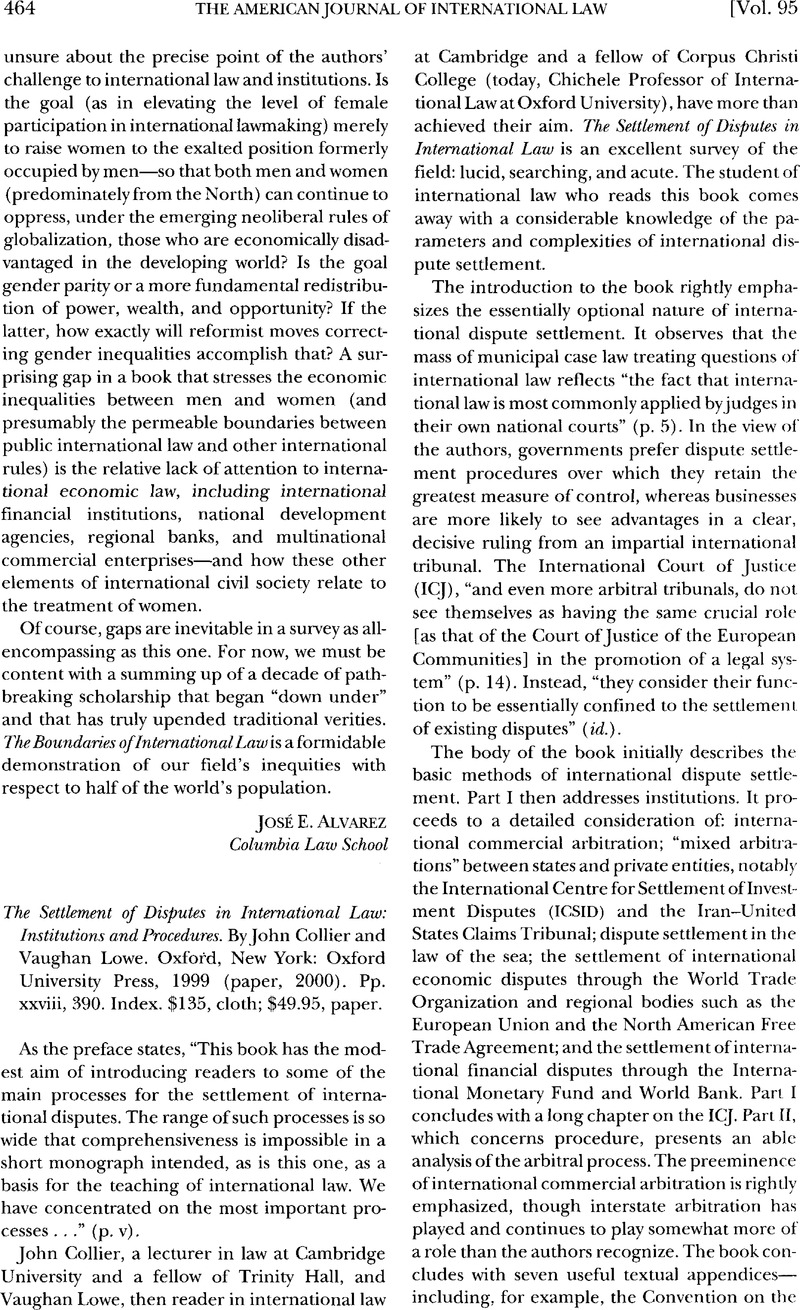No CrossRef data available.
Article contents
The Settlement of Disputes in International Law: Institutions and Procedures. By John Collier and Vaughan Lowe. Oxford, New York: Oxford University Press, 1999 (paper, 2000). Pp. xxviii, 390. Index. $135, cloth; $49.95, paper.
Published online by Cambridge University Press: 27 February 2017
Abstract

- Type
- Book Reviews and Notes
- Information
- Copyright
- Copyright © American Society of International Law 2001
References
1 To this reviewer’s knowledge, only a very few errors have crept in. The Lockerbie cases still pending in the ICJ are said to have been brought by the United Kingdom and the United States against Libya (p. 16), whereas the cases were brought by Libya against the United Kingdom and the United States. (The authors get it right at p. 173.) The authors state that in Military and Paramilitary Activities in and Against Nicaragua (1984 If J Rep. 392), Nicaragua “attempted to found jurisdiction on the two States’ optional clause declarations. Though the Court later held that it had no jurisdiction on this basis . . .” (p. 170). In fact, the Court famously held, over several dissents and widespread criticism, that it did have jurisdiction on the basis of the parties’ declarations under the optional clause (as well as under a bilateral treaty of friendship, commerce, and navigation). The authors themselves correctly capture this outcome in their fuller, critical treatment of the Court’s jurisdictional judgment in the case, which they characterize as embodying “strange reasoning” (p. 154). The decisions of the Court are available online at <http://www.icj-cij.org>.
2 Maritime Delimitation and Territorial Questions Between Qatar and Bahrain (Qatar v. Bahr.), Jurisdiction and Admissibility, 1995 ICJ Rep. 6 (Feb. 15); Maritime Delimitation and Territorial Questions Between Qatar and Bahrain (Qatar v. Bahr.), Jurisdiction and Admissibility, 1994 ICJ Rep. 112 (July 1).
3 Nuclear Tests (Austl. v. Fr.; N.Z. v. Fr.), 1974 ICJ Rep. 253 & 457 (Dec. 20).
4 See Military and Paramilitary Activities in and Against Nicaragua (Nicar. v. U.S.), Merits, 1986 ICJ Rep. 14 (June 27).
5 Military and Paramilitary Activities in and Against Nicaragua (Nicar. v. U.S.), Declaration of Intervention, 1984 ICJ Rep. 215 (Oct. 4).
6 The facts are succinctly summarized in Rosenne, Shabtai, The World Court: What it is and How it Works 152-53 (5th rev. ed. 1995).Google Scholar
7 Military and Paramilitary Activities in and Against Nicaragua (Nicar. v. U.S.) Jurisdiction and Admissibility, 1984 ICJ Rep. 392 (Nov. 26).
8 South West Africa (Eth. v. S. Afr.; Liber, v. S. Afr.), Second Phase, 1966 ICJ REP. 6 (July 18).
9 Barcelona Traction, Light and Power Co. (Belg. v. Spain), 1970 ICJ Rep. 3 (Feb. 5).




